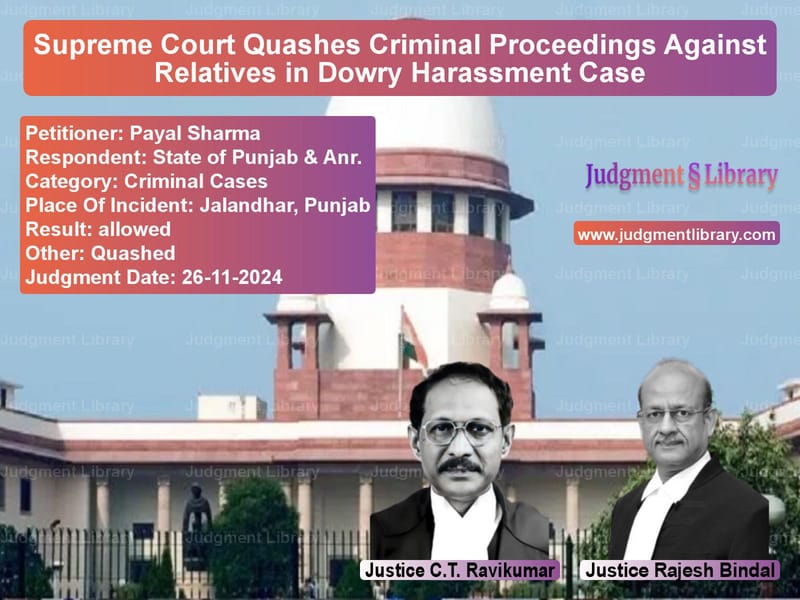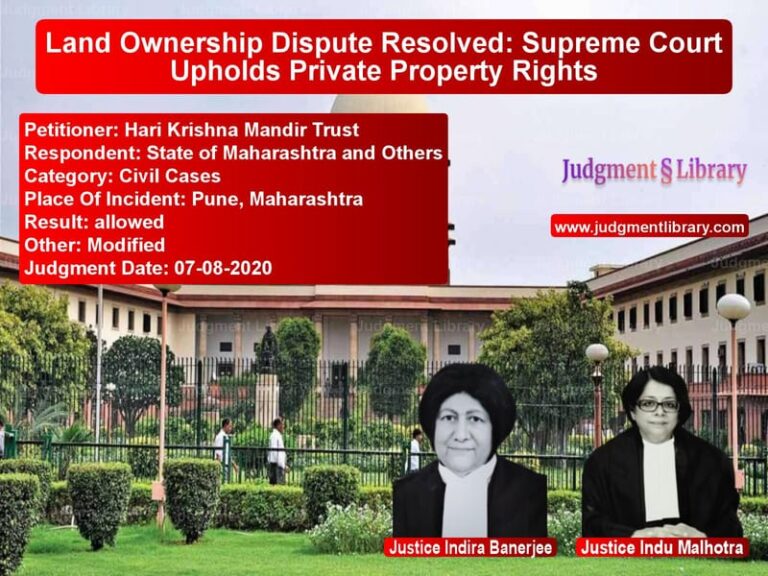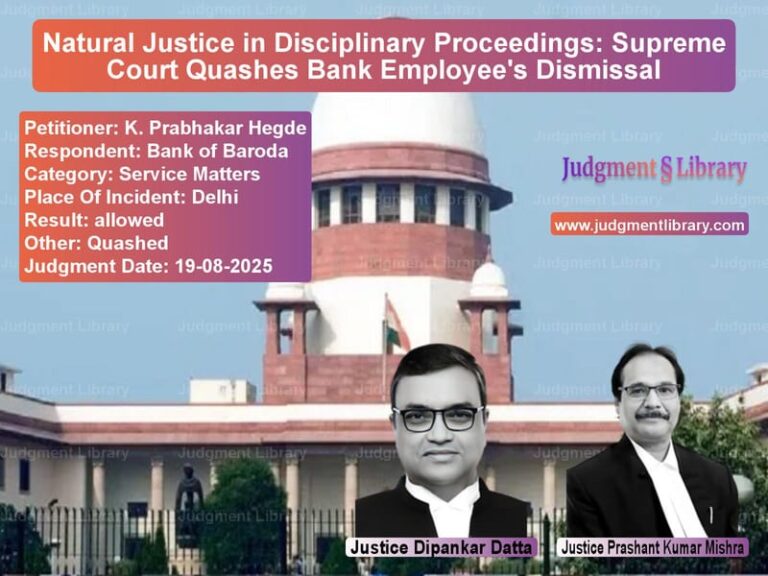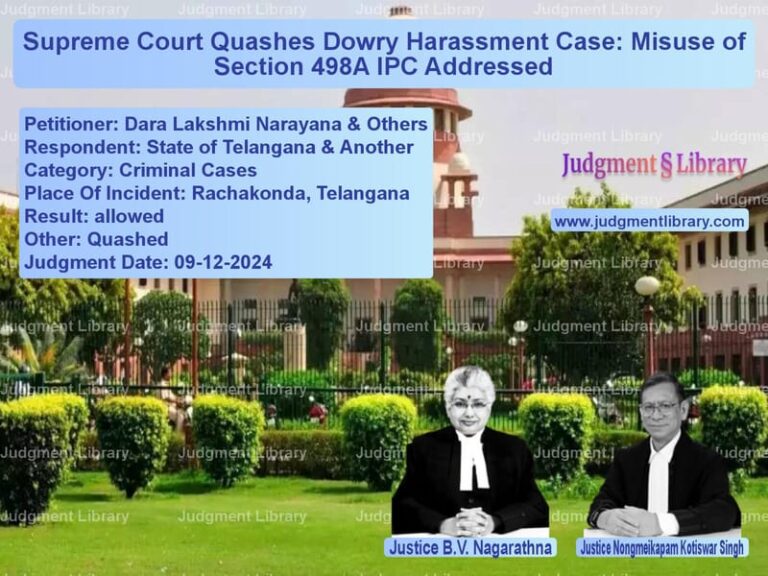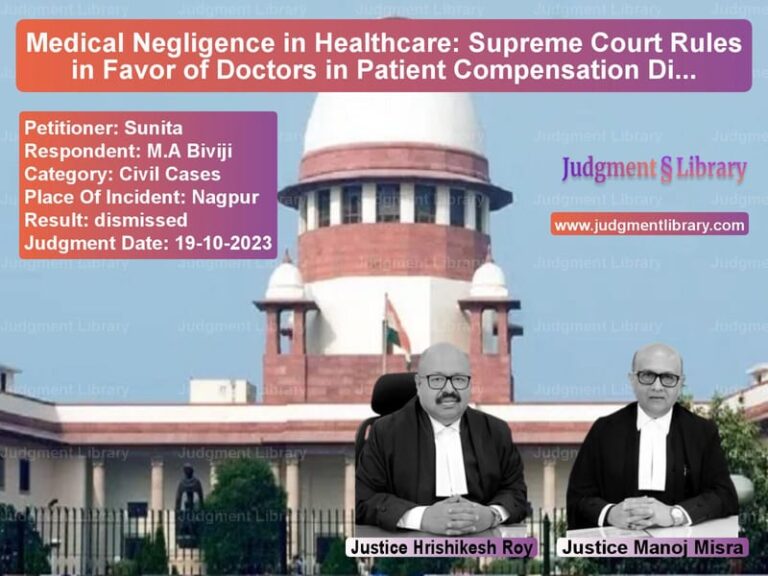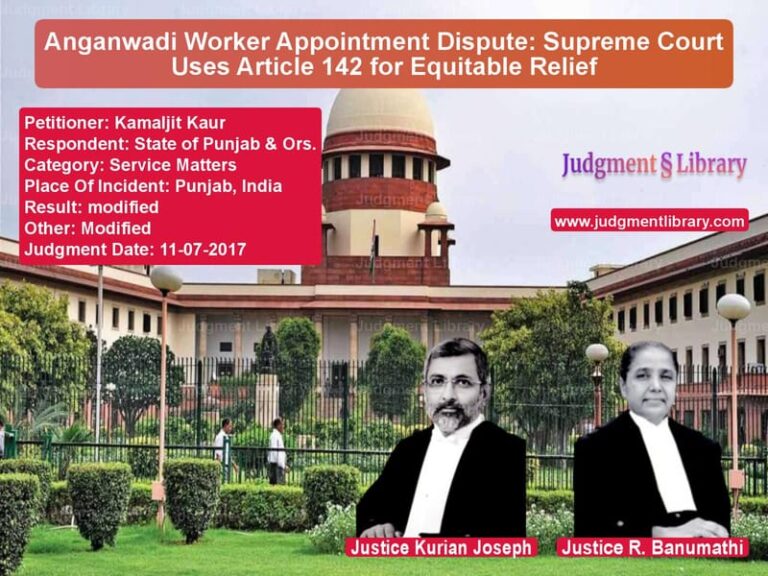Supreme Court Quashes Criminal Proceedings Against Relatives in Dowry Harassment Case
The Supreme Court of India recently delivered a landmark judgment in Payal Sharma vs. State of Punjab & Anr., addressing the issue of over-implication of distant relatives in dowry harassment cases. The case was an appeal against the Punjab and Haryana High Court’s order, which had dismissed a plea to quash criminal proceedings against a distant relative accused under Sections 406 and 498A of the Indian Penal Code (IPC). The judgment reiterates the importance of scrutinizing allegations against relatives who were not residing in the matrimonial home.
Background of the Case
The dispute arose when Vandana Sharma, the daughter of the complainant, married Amit Sharma on February 23, 2019. Shortly after, Amit Sharma moved to Canada on March 7, 2019, while Vandana remained with her in-laws in Jalandhar. Later, on December 2, 2019, Vandana also traveled to Canada. However, differences between the couple led Amit to file for divorce in Canada on September 22, 2020.
Following this, Vandana’s father filed an FIR on December 3, 2020, alleging dowry harassment and cruelty under Sections 406, 498A, 420, and 120B of the IPC. The FIR implicated not only Amit Sharma and his parents but also his cousin, Subhash Chander Kapila, and Subhash’s wife, Payal Sharma (accused No.5 and No.6). The allegations included that Vandana was forced to pay INR 15 lakhs for travel expenses and was deceived into believing she would live in a house in Jalandhar that was never owned by her husband.
Legal Issues Raised
- Whether a distant relative residing in another city could be held liable under Sections 406 and 498A IPC?
- Whether vague and general allegations in an FIR are sufficient to initiate criminal proceedings?
- Whether the High Court erred in dismissing the plea to quash criminal proceedings against Payal Sharma?
Petitioner’s Arguments
- Payal Sharma argued that she was married to Amit’s cousin and lived in Mohali, Punjab, far from the complainant’s daughter’s matrimonial home in Jalandhar.
- She contended that the allegations against her were vague, exaggerated, and part of a pressure tactic to involve the entire family in the dispute.
- She cited Supreme Court precedents that caution against over-implication of distant relatives in matrimonial disputes, particularly in cases where there is no clear evidence of wrongdoing.
- The petitioner pointed out that her husband (Amit’s cousin) had already been granted relief by the High Court, which had quashed proceedings against him, and that the same reasoning should apply to her.
Respondent’s Arguments
- The complainant argued that specific allegations had been made against Payal Sharma regarding the demand for INR 15 lakhs.
- It was contended that she actively participated in harassing Vandana and misrepresented facts about property ownership.
- The complainant maintained that the trial court was the appropriate forum to assess evidence and that the Supreme Court should not quash proceedings at this stage.
Supreme Court’s Analysis
1. Over-Implication of Distant Relatives
The Court observed that the tendency to implicate distant relatives in matrimonial disputes has led to numerous instances of harassment. It cited Preeti Gupta vs. State of Jharkhand (2010) and Geeta Mehrotra vs. State of U.P. (2012), where the Court held that mere casual reference to a relative without specific allegations should not lead to prosecution.
It ruled:
“Allegations against the accused must not be general and omnibus in nature. Courts must carefully scrutinize FIRs to ensure that distant relatives who had no role in matrimonial disputes are not needlessly dragged into criminal proceedings.”
2. Lack of Specific Allegations
The Court found that the allegations against Payal Sharma were broad and lacked concrete details. It observed:
“The FIR does not specify any particular act committed by the accused that would constitute cruelty or criminal breach of trust. There is no material to indicate that the petitioner was ever in a position to influence or participate in the alleged dowry demands.”
3. Distinction Between Family Members Residing in the Same Household and Distant Relatives
The judgment drew a distinction between direct family members living in the matrimonial home and distant relatives. It stated:
“A person who is merely related to the husband cannot be automatically presumed to be involved in dowry harassment unless there is clear evidence of active participation.”
4. Quashing Criminal Proceedings
Based on the above findings, the Supreme Court ruled that the High Court had erred in refusing to quash proceedings against Payal Sharma. It concluded:
“In the absence of specific allegations that satisfy the ingredients of Sections 406 and 498A IPC, allowing the proceedings to continue would be an abuse of the legal process.”
Final Judgment
- The Supreme Court allowed the appeal and quashed the FIR and all related proceedings against Payal Sharma.
- The appeal filed by the complainant challenging the quashing of proceedings against Payal’s husband was dismissed.
- The Court emphasized the need for judicial scrutiny in cases involving allegations against distant relatives.
Implications of the Judgment
- Protection Against False Implication: This ruling serves as a safeguard for distant relatives who are often named in FIRs without substantial evidence.
- Stricter Scrutiny of Matrimonial Disputes: Courts will now be more cautious in allowing cases to proceed against extended family members.
- Emphasis on Specific Allegations: The judgment underscores the need for clear, specific, and verifiable accusations before criminal liability is established.
- Preventing Abuse of Legal Provisions: The ruling discourages the misuse of dowry harassment laws as a means to settle personal scores.
This judgment is a significant step toward ensuring fairness in matrimonial disputes and preventing the overreach of criminal law against innocent family members.
Petitioner Name: Payal Sharma.Respondent Name: State of Punjab & Anr..Judgment By: Justice C.T. Ravikumar, Justice Rajesh Bindal.Place Of Incident: Jalandhar, Punjab.Judgment Date: 26-11-2024.
Don’t miss out on the full details! Download the complete judgment in PDF format below and gain valuable insights instantly!
Download Judgment: payal-sharma-vs-state-of-punjab-&-an-supreme-court-of-india-judgment-dated-26-11-2024.pdf
Directly Download Judgment: Directly download this Judgment
See all petitions in SC/ST Act Case
See all petitions in Bail and Anticipatory Bail
See all petitions in Domestic Violence
See all petitions in Judgment by C.T. Ravikumar
See all petitions in Judgment by Rajesh Bindal
See all petitions in allowed
See all petitions in Quashed
See all petitions in supreme court of India judgments November 2024
See all petitions in 2024 judgments
See all posts in Criminal Cases Category
See all allowed petitions in Criminal Cases Category
See all Dismissed petitions in Criminal Cases Category
See all partially allowed petitions in Criminal Cases Category

